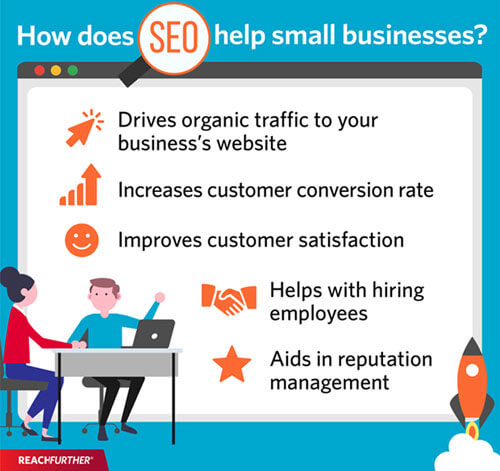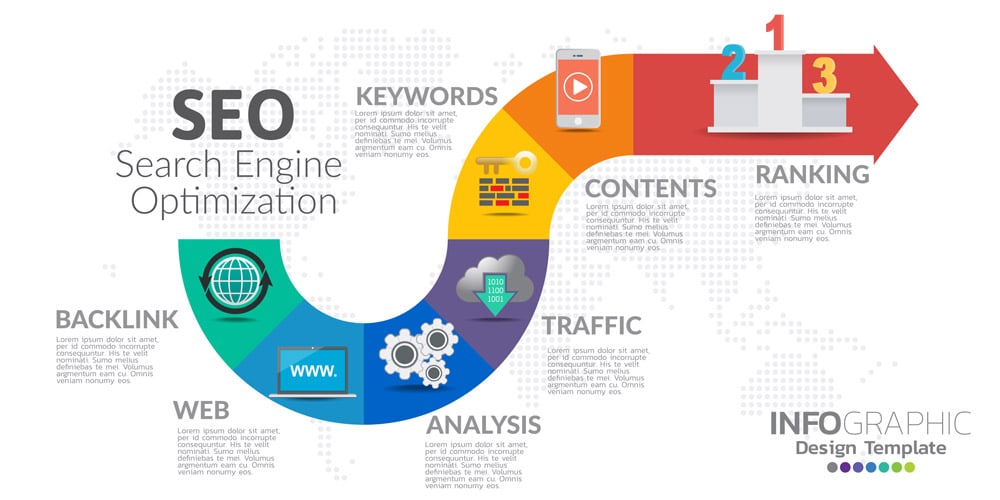Unlock the secrets to boosting your small company’s online visibility with these expert SEO strategies for maximum reach and impact.

Image courtesy of via DALL-E 3
Table of Contents
Introduction to SEO for Small Companies
SEO, or Search Engine Optimization, is like a magic spell that helps small companies show up higher on websites like Google. This means more people can find their websites, which can lead to more customers or people buying their products. It’s super important for small companies to use SEO to reach as many people as possible online.
What is SEO?
SEO is all about making your website more visible to people who are searching for things online. When you use SEO, your website can appear closer to the top of search results, making it easier for people to find you. It’s like having a bright, flashing neon sign pointing people in your direction when they’re looking for something similar to what you offer.
Why Small Companies Should Care About SEO
Small companies should care about SEO because it can help them get more visitors to their websites. When more people visit your website, there’s a bigger chance that some of them will become customers. SEO is like having a superhero cape for your website, helping it stand out in a sea of other websites and businesses.
Understanding Keywords
Keywords are like magic words that help search engines, like Google, understand what your website is all about. They are the words or phrases people type into search engines when they are looking for something specific. For example, if you have a bakery and someone is searching for “best cupcakes near me,” having the keyword “best cupcakes” on your website can help your bakery show up in the search results.
Choosing the Right Keywords
For small companies, choosing the right keywords is super important. You want to pick keywords that are related to your business and that people are actually searching for. Think about what your potential customers might type into Google when looking for a business like yours. You can use tools like Google Keyword Planner to find popular keywords and see how competitive they are. By picking the best keywords for your website, you can get noticed by more people who are interested in what you have to offer.
Optimizing Your Website Content
When it comes to making your small company’s website stand out online, creating user-friendly and attractive content is key. Let’s explore some methods to optimize your website content for both users and search engines.

Image courtesy of via Google Images
Creating Quality Content
Quality content is like a magnet that attracts visitors to your website. When you provide valuable and engaging information, users are more likely to stay on your site longer and come back for more. Search engines also love high-quality content because it shows that your website is trustworthy and relevant to users’ needs.
Using Keywords Smartly
Keywords are important words or phrases that people type into search engines to find what they’re looking for. By strategically incorporating relevant keywords into your website content, you can improve your chances of appearing in search results. However, it’s essential to use keywords naturally within your content and not to overstuff them. Focus on creating valuable and informative content that naturally includes your chosen keywords.
Simplifying Website Design for SEO
Having a well-designed website is crucial for small companies looking to improve their SEO. A website that is easy to navigate and user-friendly not only enhances the experience for visitors but also helps search engines like Google understand and index your content better.
Making Your Website Easy to Navigate
A simple and well-structured website layout is key to improving SEO. When visitors can easily find what they’re looking for on your site, they are more likely to stay longer and engage with your content. This, in turn, sends positive signals to search engines that your website is valuable and relevant, ultimately boosting your SEO rankings.
Mobile-Friendly Websites
In today’s digital landscape, where many people browse the internet on their smartphones or tablets, having a mobile-friendly website is essential for SEO success. Search engines like Google prioritize mobile-responsive websites in their rankings, as they provide a better user experience for mobile users. Ensuring your website is optimized for mobile devices not only improves your SEO but also helps you reach a wider audience.
Building Backlinks
When it comes to improving your website’s presence on search engines, backlinks play a crucial role. But what exactly are backlinks, and how can they benefit your small company’s SEO efforts? Let’s dive into the world of backlinks to understand their importance and how you can use them to your advantage.

Image courtesy of via Google Images
What Are Backlinks?
Backlinks are like digital recommendations from other websites. When a reputable website includes a link to your site within its content, it signals to search engines that your website is trustworthy and valuable. In essence, backlinks act as ‘upvotes’ for your website, helping it climb higher in search engine rankings.
How to Get Backlinks
Getting quality backlinks is essential for improving your SEO. Here are some tips on how small companies can acquire backlinks from trusted websites:
1. Create High-Quality Content: One of the best ways to attract backlinks is by producing valuable and engaging content. When your content is informative, entertaining, or solves a problem, other websites are more likely to link back to it.
2. Reach Out to Other Websites: Don’t be shy about reaching out to other website owners or bloggers in your industry. Offer to collaborate on content or provide them with a guest post in exchange for a backlink to your site.
3. Utilize Online Directories: Submit your website to reputable online directories related to your industry. These directories often have high domain authority, which can benefit your SEO through backlinks.
4. Participate in Online Communities: Engaging in online forums, social media groups, or community websites related to your niche can help you build relationships and garner backlinks naturally.
By incorporating backlink-building strategies into your SEO efforts, you can boost your website’s authority and visibility in search engine results. Remember, quality over quantity is key when it comes to backlinks, so focus on acquiring links from trustworthy sources in your industry.
Using Social Media for SEO
Social media is not just a platform for sharing cute cat videos or vacation photos. For small companies, it can be a powerful tool to boost their online presence and improve their Search Engine Optimization (SEO). Let’s dive into how social media can be your secret weapon in climbing the ranks of search engine results.
Why Social Media Matters
Social media platforms like Facebook, Instagram, Twitter, and LinkedIn are where many people spend a significant amount of their time online. By being active on these platforms and sharing content related to your business, you can drive traffic back to your website. Search engines like Google love websites that have a strong social media presence because it shows that they are engaging with their audience.
Creating Shareable Content
To make the most of social media for SEO, it’s crucial to create content that people want to share with their friends and followers. This could be informative blog posts, engaging videos, eye-catching infographics, or entertaining memes. The key is to provide value to your audience so that they are more likely to share your content, increasing your reach and visibility online.
Local SEO for Small Businesses
Local SEO is all about making sure your business shows up in local searches, like when someone looks for “pizza near me” or “hair salon in [your city].” It’s super important for small businesses because it helps people in your area find you easily online.
Image courtesy of via Google Images
Improving Your Local SEO
If you want to boost your local SEO, start by adding your business to local directories like Google My Business, Yelp, and Yellow Pages. Make sure your business address, phone number, and website are consistent across all platforms. Encourage customers to leave positive reviews for your business, as this can also help improve your local SEO. Remember, the more visible you are online locally, the more customers you can attract!
Tracking Your SEO Progress
Once you’ve implemented your SEO strategies, it’s important to track your progress to see what’s working and what needs improvement. Luckily, there are tools available to help you with this task. These tools can show you valuable information like how many visitors are coming to your website, which keywords are driving the most traffic, and how long people are staying on your site.
Making Adjustments
Based on the data you gather from tracking tools, you can make informed decisions about what changes to make to your SEO strategy. For example, if you notice that certain keywords are performing well, you can focus on optimizing more content around those keywords. On the other hand, if you see that a particular page on your website is not getting much traffic, you can update the content to make it more appealing to both users and search engines.
Conclusion
In conclusion, it’s crucial for small companies to understand and implement SEO strategies to maximize their online reach. By following the steps outlined in this guide, small businesses can improve their visibility on search engines like Google and attract more visitors to their websites. Remember, SEO is not a one-time task but an ongoing process that requires consistent effort and monitoring to see results.

Image courtesy of via Google Images
Putting It All Together
Now that you’ve learned about the importance of SEO, keywords, website content, design, backlinks, social media, local SEO, and tracking your progress, it’s time to put it all together. Start by identifying the right keywords for your business, creating quality content, optimizing your website design, building backlinks, engaging on social media, optimizing for local searches, and tracking your SEO progress. By implementing these strategies, you can maximize your online reach and grow your small company’s digital presence.
Want to turn these SEO insights into real results? Seorocket is an all-in-one AI SEO solution that uses the power of AI to analyze your competition and craft high-ranking content.
Seorocket offers a suite of powerful tools, including a Keyword Researcher to find the most profitable keywords, an AI Writer to generate unique and Google-friendly content, and an Automatic Publisher to schedule and publish your content directly to your website. Plus, you’ll get real-time performance tracking so you can see exactly what’s working and make adjustments as needed.
Stop just reading about SEO – take action with Seorocket and skyrocket your search rankings today. Sign up for a free trial and see the difference Seorocket can make for your website!
Frequently Asked Questions (FAQs)
What is SEO?
SEO stands for search engine optimization, which is a way to help websites show up higher in search results when someone looks for something on platforms like Google. It’s like making your website more visible to people searching for things online.
How Long Does SEO Take?
SEO is not a one-time thing; it’s an ongoing process. It can take some time to see the full results of your SEO efforts. It’s important to be patient and consistent with your strategies for the best outcomes.
Can I Do SEO Myself?
Yes, you can definitely do basic SEO yourself with the right knowledge and tools. There are many resources available online to help you understand the basics of SEO and start implementing them on your website. However, for more complex or technical aspects of SEO, you may want to consider hiring a professional.







